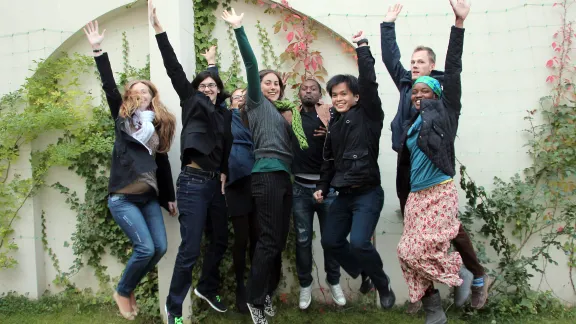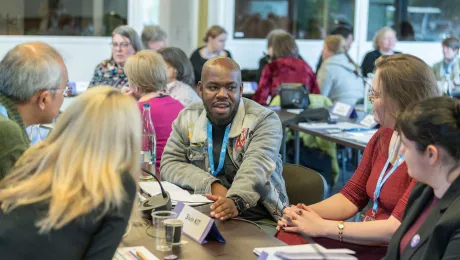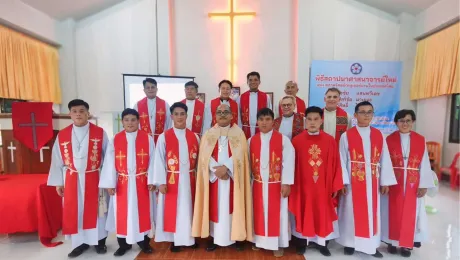
Young adults get the church moving: the Steering Group of the Youth Programme âYoung Reformers Networkâ during their first meeting in Wittenberg on 1 October 2013. Photo: LWF/GNC/F. Hübner
Ten thousand young reformers for 2017
(LWI) – Looking ahead to the Reformation Anniversary in 2017, the LWF has launched its Youth Program “Young Reformers Network” at a meeting of the International Steering Group. The group met from 26 September to 1 October in Wittenberg (Germany). There, the basic structure and the framework for the program contents were developed. Over the next four years, the program aims to initiate a series of projects relating to the Reformation involving ten thousand young people in the member churches of the LWF. The program will make suggestions and offer funding support. A key area will be the formation of a global network: a first virtual conference is planned for 2014, and in 2015 there will be a meeting of 175 young adults in Wittenberg.
New challenges for young people
A central focus of the program will be the contribution young people make to the church. Young people are the future of the church. But they have to face challenges that have never before been seen, according to Lee Darius Zhen Ying, member of the Steering Group. “These challenges are accompanied by great opportunities and for this we need ‘ongoing reformation’”. Based on this principle, the Youth Program is associated with one of the three guidelines of the LWF for its activities leading up to the Reformation Anniversary in 2017.
“We want to bring new life and energy into our churches,” declared Monica Villareal from the USA. But that doesn’t mean that everything will be changed, and the churches don’t need to be frightened. “We want to confront the changing world with our Lutheran identity and our Lutheran heritage”, was how the nine-person Steering Group summarized their plan.
Internet conferencing and personal encounters
As well as the contents of the program, the general structure was also set out. A network of young people from the LWF member churches would be built up gradually. The first step would be the establishment of an internet platform in the spring of next year. Young adults would be able to use the platform to exchange ideas about the meaning of Lutheran identity for today and to develop projects together relating to the Reformation, which they would like to implement in their own home churches. The international exchange of ideas would play a crucial role in this: “In the process of presenting our own local projects, we want to build up a global project”, according to 26-year-old Gints from Lithuania.
On Reformation Day 2014 there will be a big internet conference involving all the active members of the platform. The use of the internet is taken for granted by the younger generation. Nevertheless it is planned that in 2015 a selected group of the young reformers will meet one another in person: a global youth conference will take place in Wittenberg with 175 delegates from all the member churches of the LWF.
Alongside the core team there will be more young people involved in developing Reformation projects for their churches: there should be ten thousand of them by 2017. The first results of this will be seen at the LWF Assembly 2017 in Namibia. But the Steering Group emphasized that it will all carry on even after 2017. “We are Lutherans, we live in ongoing reformation” was the way in which 21-year-old Carolina Huth from Argentina summarized it.
The Steering Group consists of a representative of each of the seven world regions of the LWF, along with two creative advisers: Julia Braband (Evangelical Church in Central Germany, for Central Western Europe), Gints Graudiņš (Evangelical Lutheran Church of Latvia, for Central Eastern Europe), Carolina Huth (United Evangelical Lutheran Church, Argentina, for Latin America and the Caribbean), Helvi Nasiwa Muremi (Evangelical Lutheran Church in Namibia (ELCIN) for Africa), Karin Rubenson (Church of Sweden, for the Nordic countries), Monica Villarreal (Evangelical Lutheran Church in America, for North America), Lee Darius Zhen Ying (Lutheran Church in Singapore, for Asia), along with the creative advisers Moti Daba Fufa (The Ethiopian Evangelical Church Mekane Yesus) and Pamela Schulz (Evangelical Church of the Lutheran Confession in Brazil).


